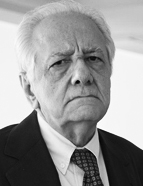

In addition to the environment in which he was raised and his familial connections with intellectual notables, his travels were pivotal to his development. He completed his secondary education at Oswaldo Cruz, Ginásio da Madalena, and Carneiro Leão schools in Recife. As a complement to his education, he attended the Faculty of Philosophy and Letters at the University of Madrid in 1955, through a scholarship from the Institute of Hispanic Culture. A brief part of his stay in Spain was spent at the home of João Cabral de Melo Neto, who held a diplomatic position there. When the scholarship expired, he was able to spend an additional year studying in London with his father, where he encountered the works of English historians such as Arnold Toynbee. His experience in Europe led him to consider a diplomatic career as an alternative to professionalisation, which would mean following in his older brother's footsteps. To that end, in 1960, he enrolled in the diplomatic career preparation course at the Rio Branco Institute. After graduating in 1962, he embarked on a profession that provided him with financial stability and opened numerous opportunities to work as a researcher in his spare time. This role allowed him easy access to libraries and extensive public archives in the countries where he served as a diplomat, until his retirement, in 1995, in Rio de Janeiro. Evaldo Cabral de Mello is thus included in a select group of Brazilians who have held public diplomatic office while also being historians, such as Francisco Adolfo de Varnhagen, José Maria da Silva Paranhos Júnior, the Baron of Rio Branco, Joaquim Aurélio Barreto Nabuco de Araújo — on whom he would later focus his studies and prepare a book — Manoel de Oliveira Lima, and the contemporary Alberto Vasconcellos da Costa e Silva.
After being appointed to a public diplomatic post in 1962, he worked in the United Nations Division of the Brazilian Ministry of Foreign Affairs (Itamaraty), serving as an advisor to the General Secretariat for Foreign Policy and as an official in the ministerial cabinet until 1964. Following the coup that established the civil-military dictatorship in Brazil (1964-1985), and due to his lack of political connections to left-wing organisations (unlike his brother, João Cabral de Melo Neto, who had temporarily lost his job a decade earlier for his ties to the Brazilian Communist Party), he held trusted positions, including serving as an adviser to the Minister of Planning, Roberto Oliveira Campos, until 1965. He left this ministry to serve as Vice-Secretary at the Embassy in Washington, D.C. (USA), for two years. Before leaving Brazil, concerned that life in the North American capital might be dull, he acquired several historiographical works on the presence of the Dutch in Portuguese America and on the Brazilian war that led to the restoration of Pernambuco. From Washington, he departed to New York, where he served as Vice-Secretary of the Brazilian Mission to the UN until 1970. In the meantime, he read O Mediterrâneo e o mundo mediterrâneo à época de Felipe II [The Mediterranean and the Mediterranean World in the Age of Philip II] (1949) by Fernand Braudel. The work undoubtedly inspired Evaldo Cabral de Mello in his pursuit to be recognised as a historian unaffiliated with any specific theoretical-methodological school: "For those who found themselves caught between conventional historiography, the Marxist vulgate, and sociologism, reading Braudel was an authentic liberation. "Here, finally, was a historian who possessed neither the bitterness of the first, nor the reductionism of the second, nor the doctrinairism of the third; and who, equipped with the tools of the latest scholarship, was able, like the great historians of the 19th century, to devote body, soul, and life to vast sections of the past" (Um imenso Portugal... [A vast Portugal...], 2002, p. 302).
This work is financed by national funds through FCT - Foundation for Science and Technology, I.P, in the scope of the projects UIDB/04311/2020 and UIDP/04311/2020.
